We wouldn’t dream of abandoning our vast semi–annual Most Anticipated Book Previews, but we thought a monthly reminder would be helpful (and give us a chance to note titles we missed the first time around). Here’s what we’re looking out for this month — for more February titles, check out our First-Half Preview. Let us know what you’re looking forward to in the comments!
(Also, as Millions founder and publisher C. Max Magee wrote recently, you can help ensure that these previews, and all our great books coverage, continue for years to come by lending your support to the site as a member. The Millions has been running for nearly 15 years on a wing and a prayer, and we’re incredibly grateful for the love of our recurring readers and current members who help us sustain the work that we do.)
 The Friend by Sigrid Nunez: In her latest novel, Nunez (a Year in Reading alum) ruminates on loss, art, and the unlikely—but necessary—bonds between man and dog. After the suicide of her best friend and mentor, an unnamed, middle-aged writing professor is left Apollo, his beloved, aging Great Dane. Publishers Weekly says the “elegant novel” reflects “the way that, especially in grief, the past is often more vibrant than the present.” (Carolyn)
The Friend by Sigrid Nunez: In her latest novel, Nunez (a Year in Reading alum) ruminates on loss, art, and the unlikely—but necessary—bonds between man and dog. After the suicide of her best friend and mentor, an unnamed, middle-aged writing professor is left Apollo, his beloved, aging Great Dane. Publishers Weekly says the “elegant novel” reflects “the way that, especially in grief, the past is often more vibrant than the present.” (Carolyn)
 Feel Free by Zadie Smith: In her forthcoming essay collection, Smith provides a critical look at contemporary topics, including art, film, politics, and pop-culture. Feel Free includes many essays previously published in The New Yorker and The New York Review of Books and it is divided into five sections: In the World, In the Audience, In the Gallery, On the Bookshelf, and Feel Free. Andrew Solomon described the collection as “a tonic that will help the reader reengage with life.” (Zoë)
Feel Free by Zadie Smith: In her forthcoming essay collection, Smith provides a critical look at contemporary topics, including art, film, politics, and pop-culture. Feel Free includes many essays previously published in The New Yorker and The New York Review of Books and it is divided into five sections: In the World, In the Audience, In the Gallery, On the Bookshelf, and Feel Free. Andrew Solomon described the collection as “a tonic that will help the reader reengage with life.” (Zoë)
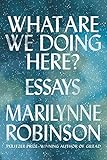 What Are We Doing Here? by Marilynne Robinson: One of my favorite literary discoveries of 2017 was that there are two camps of Robinson fans. Are you more Housekeeping or Gilead? To be clear, all of us Housekeeping people claim to have loved her work before the Pulitzer committee agreed. But this new book is a collection of essays where Robinson explores the modern political climate and the mysteries of faith, including, “theological, political, and contemporary themes.” Given that the essays come from Robinson’s incisive mind, I think there will be more than enough to keep both camps happy. (Claire)
What Are We Doing Here? by Marilynne Robinson: One of my favorite literary discoveries of 2017 was that there are two camps of Robinson fans. Are you more Housekeeping or Gilead? To be clear, all of us Housekeeping people claim to have loved her work before the Pulitzer committee agreed. But this new book is a collection of essays where Robinson explores the modern political climate and the mysteries of faith, including, “theological, political, and contemporary themes.” Given that the essays come from Robinson’s incisive mind, I think there will be more than enough to keep both camps happy. (Claire)
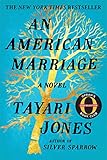 An American Marriage by Tayari Jones: In our greatest tragedies, there is the feeling of no escape—and when the storytelling is just right, we feel consumed by the heartbreak. In Jones’s powerful new novel, Celestial and Roy are a married couple with optimism for their future. Early in the book, Jones offers a revelation about Roy’s family, but that secret is nothing compared to what happens next: Roy is arrested for a crime he didn’t commit, and sentenced to over a decade in prison. An American Marriagearrives in the pained, authentic voices of Celestial, Roy, and Andre—Celestial’s longtime friend who moves into the space left by Roy’s absence. Life, and love, must go on. When the couple writes “I am innocent” to each other in consecutive letters, we weep for their world—but Jones makes sure that we can’t look away. (Nick R.)
An American Marriage by Tayari Jones: In our greatest tragedies, there is the feeling of no escape—and when the storytelling is just right, we feel consumed by the heartbreak. In Jones’s powerful new novel, Celestial and Roy are a married couple with optimism for their future. Early in the book, Jones offers a revelation about Roy’s family, but that secret is nothing compared to what happens next: Roy is arrested for a crime he didn’t commit, and sentenced to over a decade in prison. An American Marriagearrives in the pained, authentic voices of Celestial, Roy, and Andre—Celestial’s longtime friend who moves into the space left by Roy’s absence. Life, and love, must go on. When the couple writes “I am innocent” to each other in consecutive letters, we weep for their world—but Jones makes sure that we can’t look away. (Nick R.)
 The Strange Bird by Jeff VanderMeer: Nothing is what it seems in VanderMeer’s fiction: bears fly, lab-generated protoplasm shapeshifts, and magic undoes science. In this expansion of his acclaimed novel Borne, which largely focused on terrestrial creatures scavenging a post-collapse wasteland, VanderMeer turns his attention upward. Up in the sky, things look a bit different. (Check out his prodigious Year in Reading here.) (Nick M.)
The Strange Bird by Jeff VanderMeer: Nothing is what it seems in VanderMeer’s fiction: bears fly, lab-generated protoplasm shapeshifts, and magic undoes science. In this expansion of his acclaimed novel Borne, which largely focused on terrestrial creatures scavenging a post-collapse wasteland, VanderMeer turns his attention upward. Up in the sky, things look a bit different. (Check out his prodigious Year in Reading here.) (Nick M.)
 House of Impossible Beauties by Joseph Cassara: First made famous in the documentary Paris Is Burning, New York City’s House of Xtravaganza is now getting a literary treatment in Cassara’s debut novel—one that’s already drawing comparisons to Hanya Yanagihara’s A Little Life. The story follows teenage Angel, a young drag queen just coming into her own, as she falls in love, founds her own house and becomes the center of a vibrant—and troubled—community. Critics call it “fierce, tender, and heartbreaking.” (Kaulie)
House of Impossible Beauties by Joseph Cassara: First made famous in the documentary Paris Is Burning, New York City’s House of Xtravaganza is now getting a literary treatment in Cassara’s debut novel—one that’s already drawing comparisons to Hanya Yanagihara’s A Little Life. The story follows teenage Angel, a young drag queen just coming into her own, as she falls in love, founds her own house and becomes the center of a vibrant—and troubled—community. Critics call it “fierce, tender, and heartbreaking.” (Kaulie)
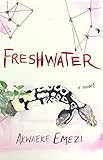 Freshwater by Akwaeke Emezi: A surreal, metaphysical debut novel dealing with myth, mental health, and fractured selves centering around Ada, a woman from southern Nigeria “born with one foot on the other side.” She attends college in the U.S., where several internal voices threaten to pull her apart. Library Journal calls this “a gorgeous, unsettling look into the human psyche.” Read Emezi’s lovely, illuminating essay on gender, transition, and Igbo ontology in The Cut. (Lydia)
Freshwater by Akwaeke Emezi: A surreal, metaphysical debut novel dealing with myth, mental health, and fractured selves centering around Ada, a woman from southern Nigeria “born with one foot on the other side.” She attends college in the U.S., where several internal voices threaten to pull her apart. Library Journal calls this “a gorgeous, unsettling look into the human psyche.” Read Emezi’s lovely, illuminating essay on gender, transition, and Igbo ontology in The Cut. (Lydia)
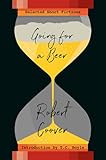 Going for a Beer by Robert Coover: Thirty stories from the last fifty years by the playful postmodern author who Alan Moore called one of “America’s greatest literary geniuses.” Read the titular story, published in The New Yorker in 2011, here. (Lydia)
Going for a Beer by Robert Coover: Thirty stories from the last fifty years by the playful postmodern author who Alan Moore called one of “America’s greatest literary geniuses.” Read the titular story, published in The New Yorker in 2011, here. (Lydia)
 Where the Dead Sit Talking by Brandon Hobson: A coming-of-age story out of Oklahoma in the 1980s, Hobson’s fourth book follows a fifteen-year-old Cherokee boy named Sequoyah and a relationship he forms with a girl in the foster home they share. In a starred review, Publisher’s Weekly writes “Hobson’s narrative control is stunning, carrying the reader through scenes and timelines with verbal grace and sparse detail. Far more than a mere coming-of-age story, this is a remarkable and moving novel.” (Lydia)
Where the Dead Sit Talking by Brandon Hobson: A coming-of-age story out of Oklahoma in the 1980s, Hobson’s fourth book follows a fifteen-year-old Cherokee boy named Sequoyah and a relationship he forms with a girl in the foster home they share. In a starred review, Publisher’s Weekly writes “Hobson’s narrative control is stunning, carrying the reader through scenes and timelines with verbal grace and sparse detail. Far more than a mere coming-of-age story, this is a remarkable and moving novel.” (Lydia)
 Red Clocks by Leni Zumas: The latest novel from the author of The Listeners follows five women of different station in a small town in Oregon in a U.S. where abortion and IVF have been banned and embryos have been endowed with all the rights of people. A glimpse at the world some of our current lawmakers would like to usher in, one that Maggie Nelson calls “mordant, political, poetic, alarming, and inspiring–not to mention a way forward for fiction now.” (Lydia)
Red Clocks by Leni Zumas: The latest novel from the author of The Listeners follows five women of different station in a small town in Oregon in a U.S. where abortion and IVF have been banned and embryos have been endowed with all the rights of people. A glimpse at the world some of our current lawmakers would like to usher in, one that Maggie Nelson calls “mordant, political, poetic, alarming, and inspiring–not to mention a way forward for fiction now.” (Lydia)
 Heart Berries by Terese Mailhot: In her debut memoir, Mailhot—raised on the Seabird Island Indian Reservation in southwestern Canada, presently a postdoctoral fellow at Purdue—grapples with a dual diagnosis of PTSD and Bipolar II disorder, and with the complicated legacy of a dysfunctional family. Sherman Alexie has hailed this book as “an epic take—an Iliad for the indigenous.” (Emily)
Heart Berries by Terese Mailhot: In her debut memoir, Mailhot—raised on the Seabird Island Indian Reservation in southwestern Canada, presently a postdoctoral fellow at Purdue—grapples with a dual diagnosis of PTSD and Bipolar II disorder, and with the complicated legacy of a dysfunctional family. Sherman Alexie has hailed this book as “an epic take—an Iliad for the indigenous.” (Emily)
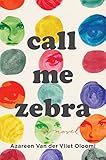 Call Me Zebra by Azareen Van der Vliet Oloomi: If the driving force of Van der Vliet Oloomi’s first novel, Fra Keeler, was “pushing narrative to its limits” through unbuilding and decomposition, her second novel, Call Me Zebra, promises to do the same through a madcap and darkly humorous journey of retracing the past to build anew. Bibi Abbas Abbas Hossein is last in a line of autodidacts, anarchists, and atheists, whose family left Iran by way of Spain when she was a child. The book follows Bibi in present day as she returns to Barcelona from the U.S., renames herself Zebra and falls in love. Van der Vliet Oloomi pays homage to a quixotic mix of influences—including Miguel de Cervantes, Jorge Luis Borges, and Kathy Acker—in Call Me Zebra, which Kirkus calls “a brilliant, demented, and bizarro book that demands and rewards all the attention a reader might dare to give it.” (Anne)
Call Me Zebra by Azareen Van der Vliet Oloomi: If the driving force of Van der Vliet Oloomi’s first novel, Fra Keeler, was “pushing narrative to its limits” through unbuilding and decomposition, her second novel, Call Me Zebra, promises to do the same through a madcap and darkly humorous journey of retracing the past to build anew. Bibi Abbas Abbas Hossein is last in a line of autodidacts, anarchists, and atheists, whose family left Iran by way of Spain when she was a child. The book follows Bibi in present day as she returns to Barcelona from the U.S., renames herself Zebra and falls in love. Van der Vliet Oloomi pays homage to a quixotic mix of influences—including Miguel de Cervantes, Jorge Luis Borges, and Kathy Acker—in Call Me Zebra, which Kirkus calls “a brilliant, demented, and bizarro book that demands and rewards all the attention a reader might dare to give it.” (Anne)
 Carceral Capitalism by Jackie Wang: Part of Semiotext(e)’s Intervention series, this series of essays by poet and scholar Jackie Wang explores “racial capitalism,” situating predatory lending practices on a continuum with incarceration. Read an excerpt describing the five planks of racial capitalism at The New Inquiry. (Lydia)
Carceral Capitalism by Jackie Wang: Part of Semiotext(e)’s Intervention series, this series of essays by poet and scholar Jackie Wang explores “racial capitalism,” situating predatory lending practices on a continuum with incarceration. Read an excerpt describing the five planks of racial capitalism at The New Inquiry. (Lydia)
 All the Castles Burned by Michael Nye: Year in Reading alum has written his debut novel, a look at class and masculinity through the lens of basketball at a prestigious prep school in Ohio, and a friendship between two boys at opposite ends of the socioeconomic ladder. Publisher’s Weekly called it “a suspenseful and memorable novel.” (Lydia)
All the Castles Burned by Michael Nye: Year in Reading alum has written his debut novel, a look at class and masculinity through the lens of basketball at a prestigious prep school in Ohio, and a friendship between two boys at opposite ends of the socioeconomic ladder. Publisher’s Weekly called it “a suspenseful and memorable novel.” (Lydia)
 House of Erzulie by Kirsten Amani Kasai: This novel comprises three intertwined stories centered around a Creole slave-owning family in Louisiana, and the present-day historian who discovers a trove of correspondence relating to its members. This title is from the new Shade Mountain Press, whose tag line is “a mob of scribbling women” (“In 1855 Nathaniel Hawthorne griped that ‘a damned mob of scribbling women’ had overrun the publishing scene. A century and a half later, that mob has still failed to materialize,” its website reads). (Lydia)
House of Erzulie by Kirsten Amani Kasai: This novel comprises three intertwined stories centered around a Creole slave-owning family in Louisiana, and the present-day historian who discovers a trove of correspondence relating to its members. This title is from the new Shade Mountain Press, whose tag line is “a mob of scribbling women” (“In 1855 Nathaniel Hawthorne griped that ‘a damned mob of scribbling women’ had overrun the publishing scene. A century and a half later, that mob has still failed to materialize,” its website reads). (Lydia)
The post February Preview: The Millions Most Anticipated (This Month) appeared first on The Millions.
from The Millions http://ift.tt/2BJjmjJ
Comments
Post a Comment